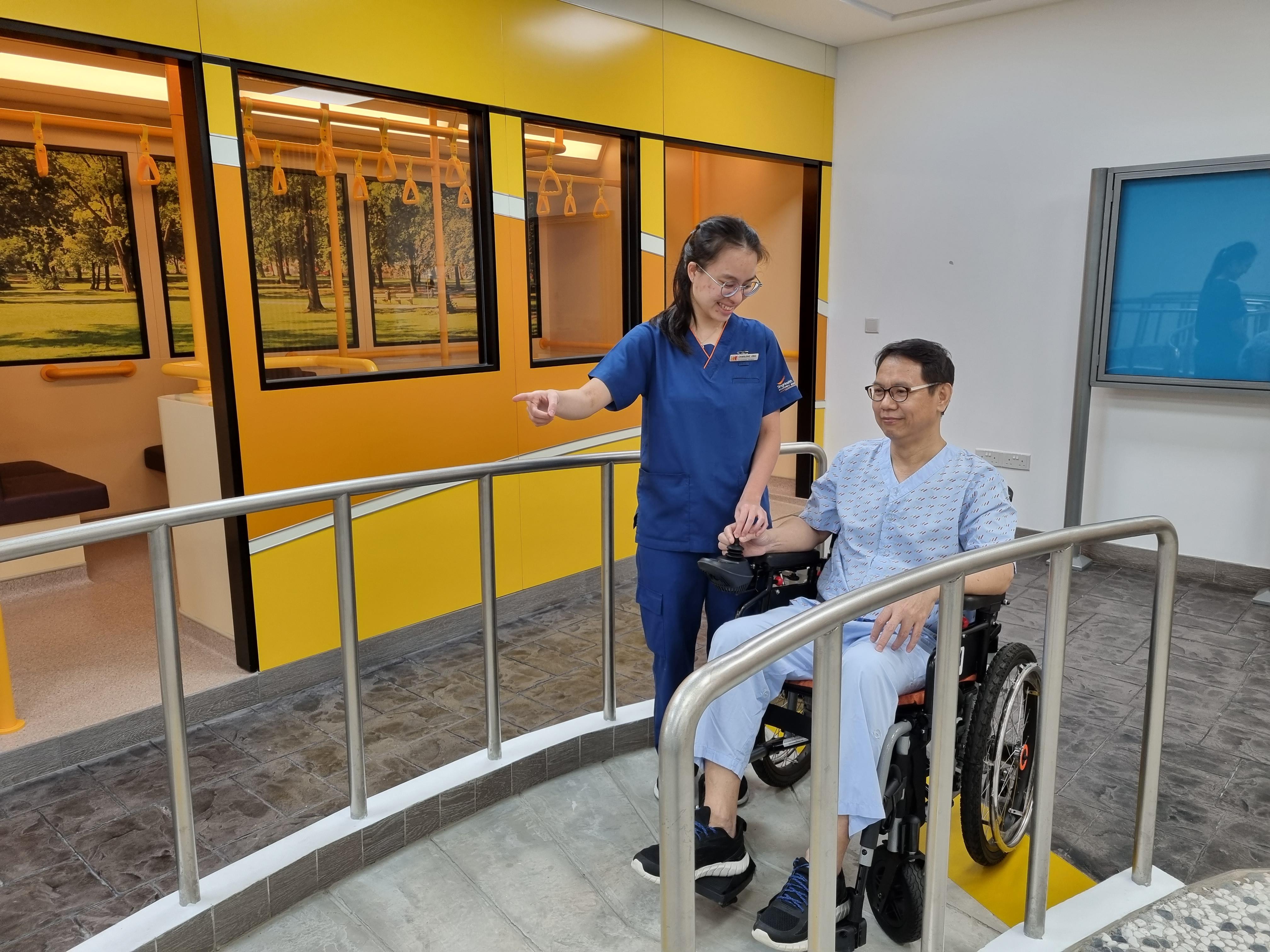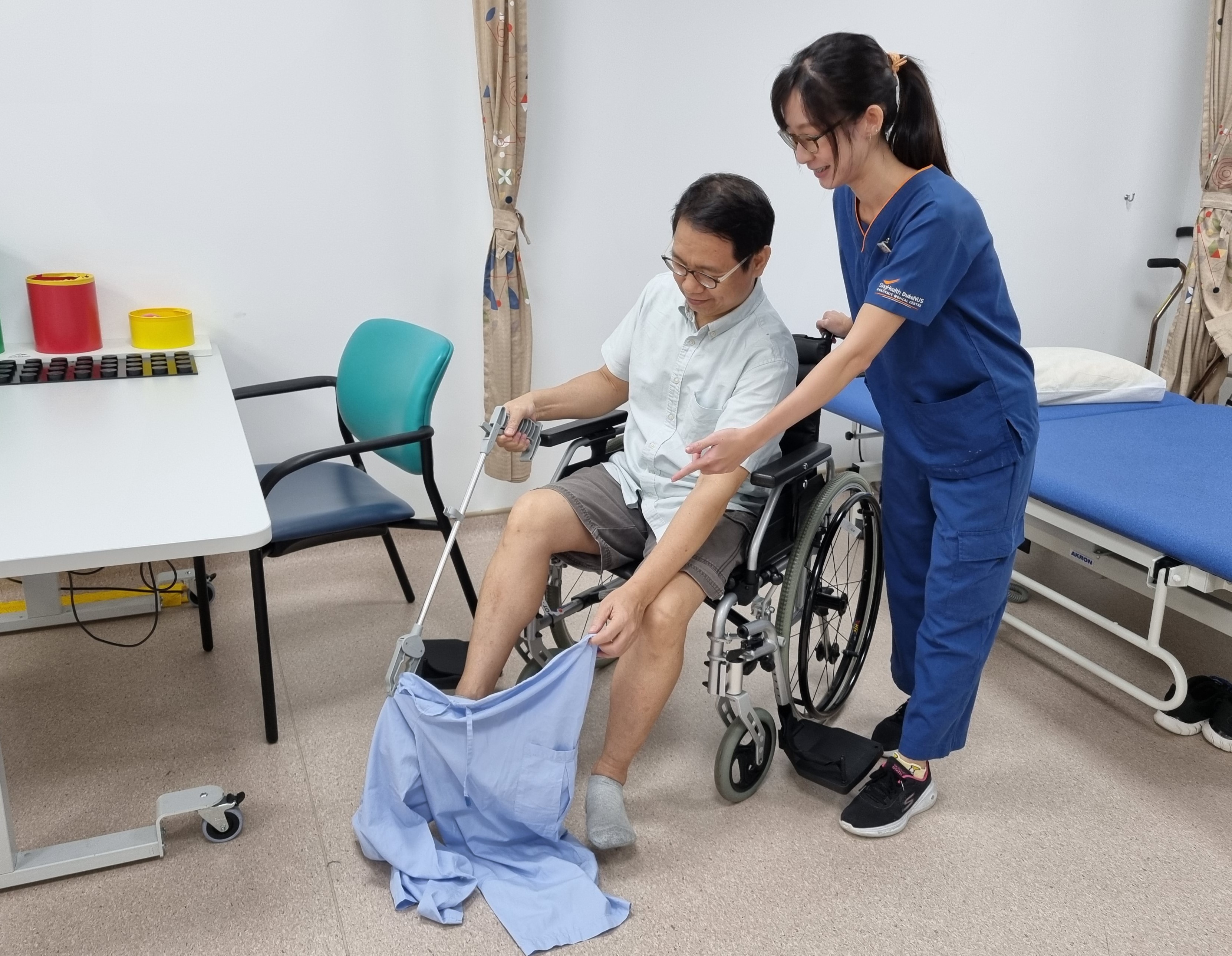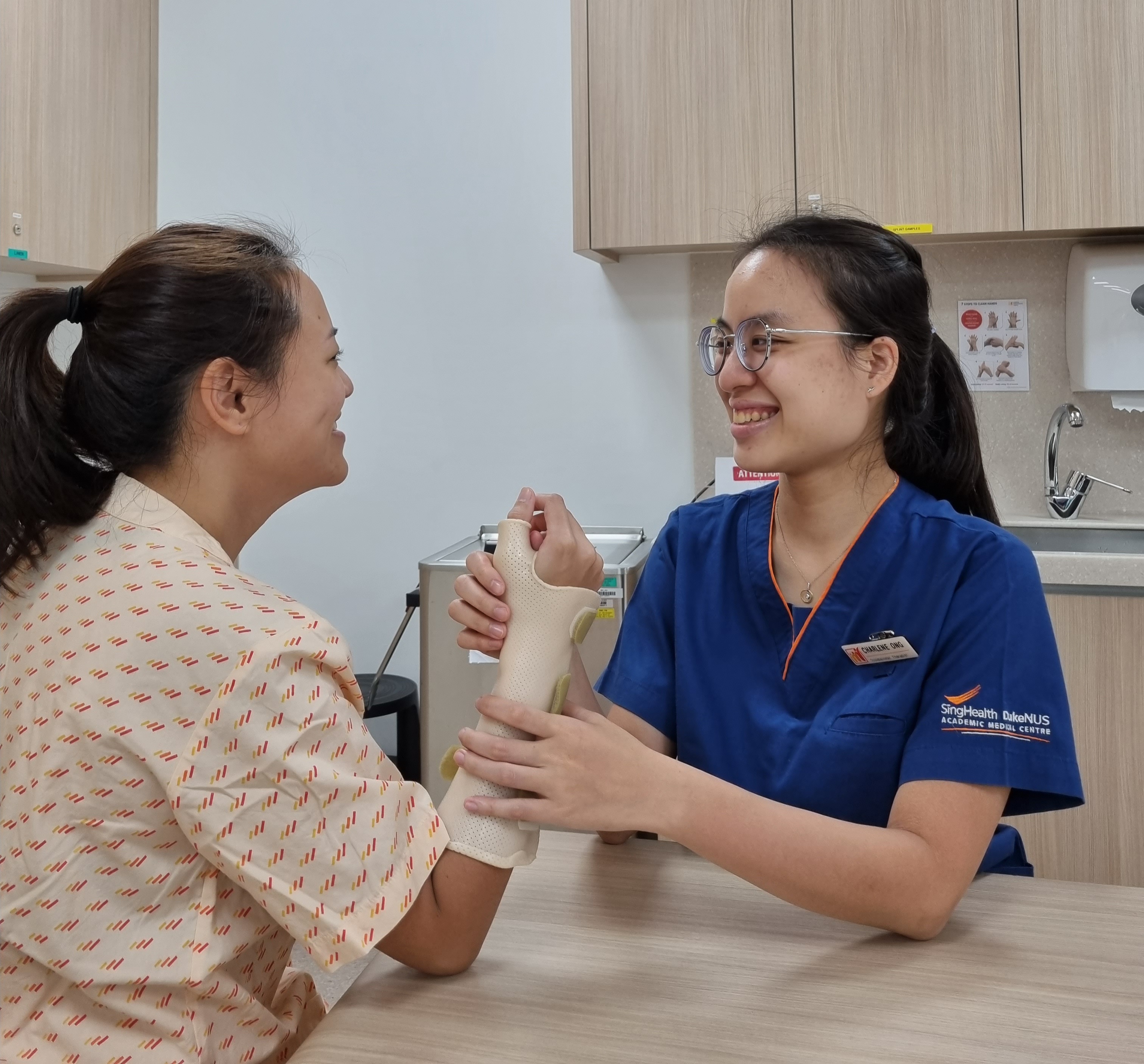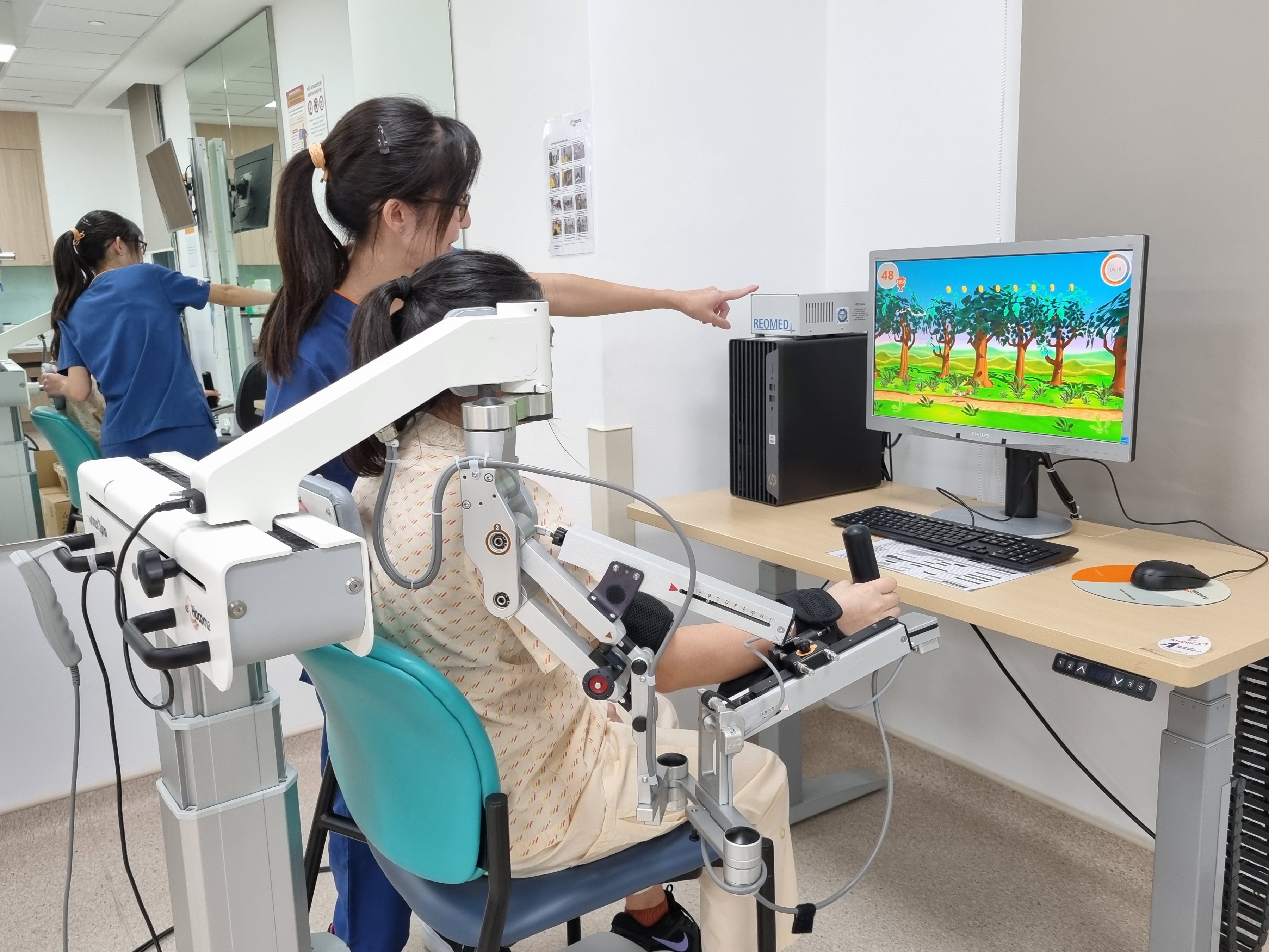
Occupational Therapy




Occupational Therapists are healthcare professionals who work with individuals of all ages, with the goal of enabling participation in meaningful roles and occupations despite the presence of disabilities. The Department of Occupational Therapy at Sengkang General Hospital promotes health and well-being by supporting individuals to return to their daily functions and perform day-to-day meaningful activities revolving around self-care, leisure, and productivity.
Our team of Occupational Therapists work with individuals who experience a range of physical, cognitive, or psychiatric challenges either from birth or as the result of accident, illness, or ageing. Our primary goal is to enable these individuals to find ways to continue participating in meaningful activities safely in their homes and communities.
To maximise each individual’s function and quality of life, our Occupational Therapists work closely with them to identify strengths and barriers to participation, collaborate on specific goals, before designing a customised treatment or rehabilitation programme appropriate to each individual’s unique values, needs and preferences.
Our therapy programme involves carefully selected activities to enhance each individual's physical, cognitive and/ or psychosocial abilities in both inpatient and outpatient settings, as well as recommendations on environmental modifications and assistive devices to promote safety and participation in meaningful activities. Caregiver training may also be done to equip families or caregivers with the skills to care for their loved one’s post-discharge, improving their confidence and reducing incidences of caregiver stress.
Our Clinical Services
Neurorehabilitation
Neurological rehabilitation is targeted at individuals who are recovering from acute or chronic neurological conditions such as stroke, traumatic brain injury, Parkinson's diseases, spinal cord injuries and many more. Occupational Therapy aims to promote the return of motor, cognitive and sensory-perceptual functions, reduce and/or manage symptoms, promote participation in meaningful occupations, hence enhancing the overall quality of life of the individual.
Apart from working with individuals and their caregivers through one-on-one intensive rehabilitation based on their unique needs (such as through physical, cognitive, perceptual retraining and Activities of Daily Living retraining) in the wards, our Occupational Therapists also follow up with individuals in the outpatient setting to continue reintegrating them back into their communities and supporting their return to work.
Hands and Upper Limb Rehabilitation
Geriatric Rehabilitation
Older adults may face cognitive, physical, and psychosocial challenges due to chronic and/or acute medical conditions.
Occupational Therapists work with these older adults and their caregivers by empowering them with strategies to support engagement in meaningful occupations within their homes and communities, while promoting safety and well-being.
Our range of services includes:
Orthopaedic-Surgical Rehabilitation
In the Orthopaedic - Surgical Rehabilitation setting, Occupational Therapy aims to optimise the individual’s functional independence following upper and/or lower limbs injuries, amputation, traumatic brain, and spinal cord injuries through individualized intervention. Patients who have undergone various surgical procedures (such as colectomy, cholecystectomy, gastrectomy, craniectomy and laminectomy) are also part of this rehabilitation process to enhance their independence in activities of daily living.
Patients will be educated and equipped with relevant skills and knowledge to incorporate specific precautions that must be adhered to post-surgery into their routines and activities of daily living. Our Occupational Therapists work closely with these individuals to help them regain their physical and cognitive skills and educate caregivers on how to perform their daily activities. This may include learning how to incorporate the use of assistive devices and orthosis during daily activities. Splints may also be fabricated to promote better positioning and use of extremities post-injuries. Wheelchair assessment and training is also part of the rehabilitation process to support their mobility post-injuries within the comfort of the patients’ home and community.
Critical Care Rehabilitation
Occupational Therapy has a role to play in enabling early mobilization in the critical care setting to prevent further deconditioning of the patients’ physical and cognitive functions. Proper positioning in bed and providing orthosis (such as resting ankle foot orthosis or resting hand splint) are some of the interventions provided to prevent joint tightness and promote better lung expansion for breathing. Tailored interventions to prevent Intensive Care Unit (ICU) related delirium and promote arousal level through activity engagement and sensory stimulation are also delivered. Moreover, patients on ventilatory support are enabled and supported to engage in simple bed side activities, such as grooming. Patients are thereby encouraged to participate in meaningful occupations despite being in the critical care setting.
Oncology Rehabilitation
Occupational Therapy in oncology rehabilitation is tailored for individuals living with cancer, through addressing and managing symptoms faced such as fatigue, pain, and psychosocial needs at different stages of cancer. Our Occupational Therapists also collaborate closely with these individuals to identify roles and activities that are meaningful and purposeful to them. Through rehabilitation, patient education in energy conservation techniques and prescription of assistive devices, we aim to enhance these individuals' quality of life and support them in achieving goals and wishes closest to their hearts.
Mental Health Rehabilitation
Occupational Therapists work with individuals with psychiatric conditions in reintegrating into the community and performing daily occupations in an adaptive manner.
Our range of services / interventions includes:
Paediatric Rehabilitation
Occupational Therapists in this service work closely with children with physical disabilities, developmental disabilities, or other challenges, with the aim of facilitating their achievement of age-appropriate developmental milestones and supporting their participation in self-care, school, play and leisure activities. Our Occupational Therapists collaborate with children and their parents to identify specific challenges and goals, before developing individualised treatment plans based on each child’s needs. Interventions may include handwriting training, social skills training, visual perceptual training, attention and behavioural management, sensory regulation, gross and fine motor skills training.
Postmastectomy Rehabilitation and Lymphoedema Management
The post-mastectomy rehabilitation team provides pre-operative education and post-operative rehabilitation to individuals diagnosed with breast cancer. The goals of rehabilitation are a) to help individuals to regain as much shoulder movements as before the surgery so that they are able to resume activities that they do at home, at work and in recreation, and b) to monitor and manage lymphedema for individuals with axillary lymph nodes clearance.
Early intervention and good management of lymphedema is crucial for improving one’s quality of life and ensuring continued participation in activities of daily living. Our Occupational Therapists will work with these individuals to integrate lymphedema self-management strategies to overcome these challenges; supporting them to maintain or increase their independence in their daily living.
Return to Work Program
The post-mastectomy rehabilitation team provides pre-operative education and post-operative rehabilitation to individuals diagnosed with breast cancer. The goals of rehabilitation are a) to help individuals to regain as much shoulder movements as before the surgery so that they are able to resume activities that they do at home, at work and in recreation, and b) to monitor and manage lymphedema for individuals with axillary lymph nodes clearance.
Early intervention and good management of lymphedema is crucial for improving one’s quality of life and ensuring continued participation in activities of daily living. Our Occupational Therapists will work with these individuals to integrate lymphedema self-management strategies to overcome these challenges; supporting them to maintain or increase their independence in their daily living.
Link nội dung: https://myphamsakura.edu.vn/occupational-therapist-a58184.html